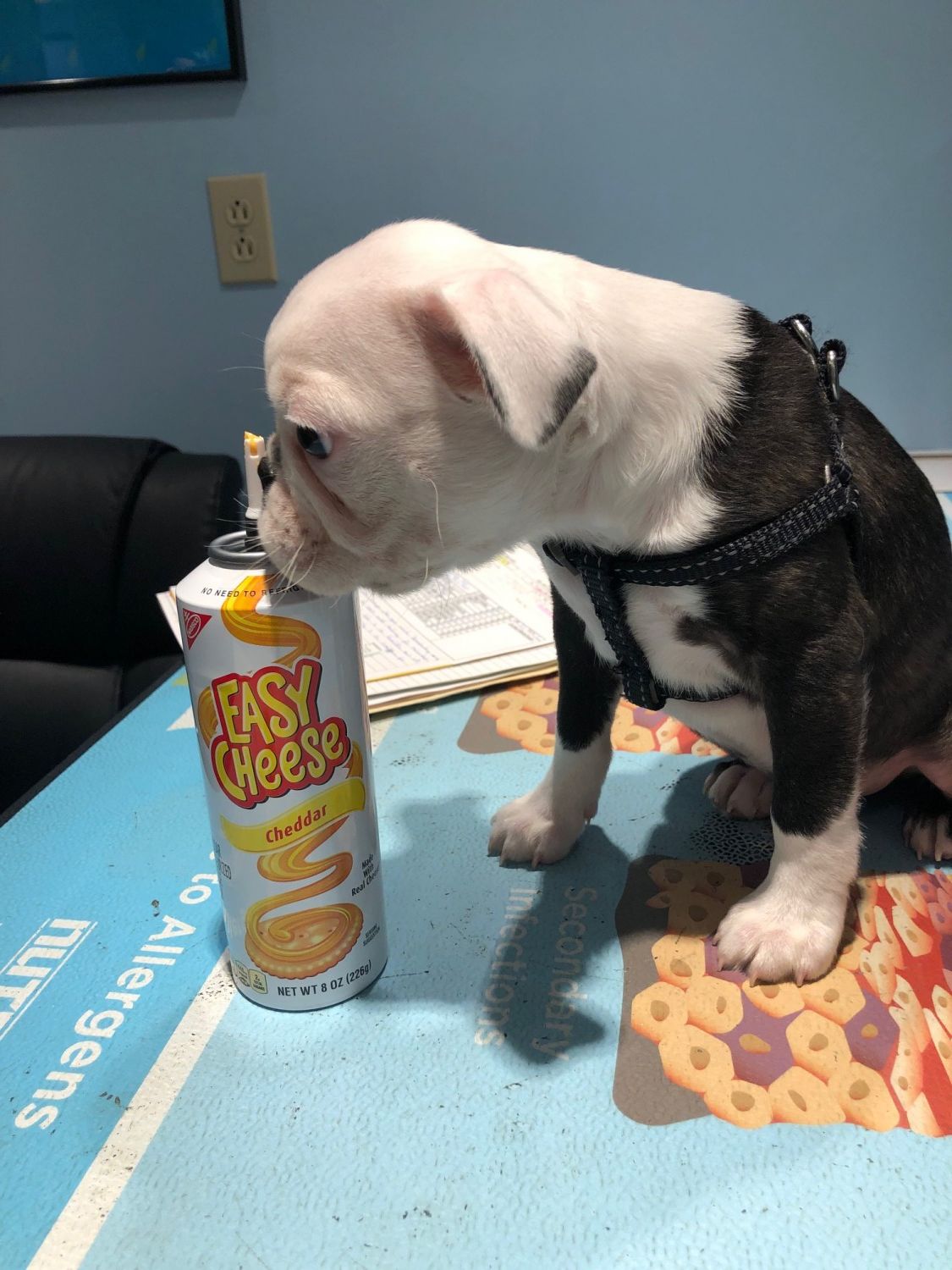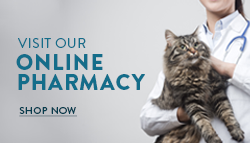|
We are happy you have chosen us to help you take care of your new pet. Having a new puppy can be a very exciting experience-and trying at times. This information will help you get started on some of the puppy basics.
 Feeding Your Puppy Feeding Your Puppy
A commercial puppy food is best for your new dog. If you know the brand of food the puppy was eating before you brought him home, it is best to start with that. You may gradually mix in your brand of choice with the original food over a week or two.
If your puppy is having difficulty chewing the kibbles, it may help to moisten the food with warm water a few minutes before feeding. Puppies that are eating solid food do not need to drink milk. Puppies should be fed three times a day until 4-6 months old and then twice a day thereafter. It is best to start by following the amount recommended on the food bag then adjust the amount fed according to what your puppy eats.
If your puppy is a large breed puppy (which means it will weigh more than 60 pounds when full grown), we recommend feeding an AAFCO certified puppy food for large or giant breed puppies. It is specifically made to decrease the severity of hip dysplasia, by providing the optimum levels of certain nutrients for your puppy’s developing bone and joints.
Also, avoid feeding table scraps as this may lead to poor eating habits. Food quality can vary somewhat among the various brands, so select a brand that has been recommended to you. Be careful not to over feed your puppy or adult dog. Research has shown that dogs that are thin and trim tend to live longer, healthier lives than their overweight counterparts.
Please call us if you would like help with a weight loss program for an overweight pet.
Vaccinations
The health of your puppy during his first few months is dependent on his body’s ability to fight off disease. Having your puppy vaccinated regularly against diseases such as distemper and parvo virus will help his body build up a strong immune system. We recommend that puppies receive a series of distemper vaccinations. The first one can be given at 6 to 8 weeks of age and should be repeated every 3 to 4 weeks until the series of three (sometimes four) injections have been completed.
We also recommend puppies in this area be vaccinated for leptospirosis, a water borne disease that causes kidney failure. The first vaccine will be given in combination with your puppy’s last distemper vaccine, and the second one 3-4 weeks later.
At 12 weeks of age your puppy can get vaccinated against rabies virus. It is important that this vaccine be given. There is a significant population of wildlife in this area infected with rabies (notably raccoons, bats and skunks). Remember that rabies is contagious to humans and is universally fatal, so vaccinating your pet for this disease not only protects your pet, but you and your family as well!
In recent years we have been seeing more ticks in this area, some of which are carrying Lyme disease. In addition to taking flea/tick control measures, we recommend the lyme vaccine for animals that are at risk.
There is also a bordetella or “kennel cough” vaccination available. This vaccine is recommended when your puppy is going to be exposed to other dogs (boarding kennels or training classes).
Parasites
Your new puppy may have arrived at your home with some tag-along friends--intestinal parasites! Roundworms, hookworms and whipworms are common intestinal parasites. They can cause weakness, depression, weight loss, diarrhea and vomiting.
Human infection with roundworms is possible but rare. It most commonly occurs in children who play in areas such as sandboxes or yards which have become contaminated with dog or cat fecal material, then fail to wash their hands properly before eating. It is important to cover sandboxes when not in use, and to practice good hygiene when handling your new puppy.
Intestinal parasites can be detected by routine fecal exams. Treatment is relatively simple if your puppy is not too sick. We recommend bringing a sample of fresh stool with you at the time of each vaccination and check-up.
Heartworm
We recommend that every dog be protected against heartworm disease during the summer. Heartworm is a parasite that lives in the bloodstream and heart of dogs. It is transmitted by mosquitoes. All dogs should be tested annually for heartworm and put on a monthly pill that prevents the dog from becoming infected. Your puppy might not have to be tested the first year, but he will need preventative starting in May and continuing through December. If your puppy is growing, he may need to be weighed every month to make sure he gets the tablet that is the right strength for him.
Neutering & Spaying
Puppies may be neutered as early as 5 months of age. We recommend that females be spayed before their first heat cycle. This reduces the chances of your puppy developing mammary tumors later in life. Before doing surgery on your pet, we recommend doing pre-surgical blood work, which will tell us the kidney and liver values and a complete blood count. This testing is not mandatory, but it is recommended. It helps us be aware of and try to prevent potential problems that we may encounter during surgery, and also provides us with valuable base line info in case of later illnesses.
If you are considering breeding your puppy when it is older, we recommend that you discuss this now with the veterinarian, and perhaps a few dog breeders, so that you will know what is involved. Many unwanted animals are put to sleep every year. Your lucky puppy has found a good home! No one can guarantee that will happen to the next litter.
Dental Care
Routine dental care is an important part of your dog’s life-long health and well being. Proper dental care can help prevent liver, lung, kidney, and heart problems that may develop later in life. It is not too soon to start brushing your dog’s teeth when it is a puppy. This way they become accustomed to the brushing and may even look forward to their chicken or vanilla mint flavored toothpaste. Have your veterinarian show you the different types of toothbrushes and explain how to get your dog used to having his teeth brushed.
Please do not use human toothpaste to brush your puppy’s teeth-it is not meant to be swallowed and may make him sick. At every yearly exam, the doctor will inspect your dog’s teeth and recommend a routine dental cleaning if needed. Also ask your veterinarian about diets which may help keep your pet’s teeth clean.
Flea and Tick Control
Your veterinarian will examine your puppy for evidence of fleas. Fleas and ticks are blood-sucking parasites that can cause your puppy to become very anemic and ill. It is important that you control the fleas in the dog’s home environment. For every flea you see on your puppy, there are 20 eggs and larvae in your house!
Please ask our staff for advice on flea and tick control that will best suit your puppy’s needs-even if your puppy does not have a current flea or tick problem. There are many options for treating flea and tick problems, such as once-a-month oral pills and spot-on applications.
Identification
We strongly recommend having some form of identification on your puppy. No one wants to think about their puppy missing, but accidents happen. Whether he runs out an open door or slips his collar, identification could increase his chances of returning home to you.
Two types of permanent identification are tattoos and microchips. For tattoos, your puppy will need to be lightly sedated, and then we tattoo an assigned number to his inner thigh. A microchip can be administered without sedation. The chip is injected under the skin with a special applicator.
If you decide against using a permanent identification method, we recommend using a tag with the puppy’s name, your name and phone number on his collar. Many dogs have been reunited with their families because of these tags.
House Training
If you are lucky, you have a puppy that is already trained to go to the bathroom outside. Puppies will learn to go to the bathroom on newspaper, in litter boxes, or outside.
We recommend that you train your puppy to go outdoors from the very beginning. If they learn to go on newspaper, it may be a difficult habit to break. Please take your puppy outside every few hours and especially after eating or right after he wakes up. It is very important that you praise the puppy after he has gone outside. You might even want to give a small treat if you think the puppy needs added incentive. Do not punish your puppy for going to the bathroom in the wrong place after he has already done it. He won’t know why you are angry and may associate it with something other than soiling your house.
The keys to good housetraining are:
1) anticipating when your puppy will need to go to the bathroom, such as right before or after eating or when he first wakes up, and
2) a regular, consistent schedule with frequent trips outdoors. Puppies tend to return to the same places outdoors to go the bathroom, so be sure to return to these same spots frequently, and soon these areas will become his “bathroom”. Pick a term to use as a command when you take him out, like “go to the bathroom” or “go potty”, and soon he will learn what you expect him to do when you say that command, and
3) Ensure that your puppy is either being monitored at all times, or is confined in a space small enough that he won’t use it as a “bathroom”. This could be a crate, or a portion of a room fenced off with a baby gate.
Crate Training
Dogs are den animals, and actually prefer sleeping in a small, safe place. The cost of a crate may initially seem very expensive, but think how much it will cost to redo your living room! We highly recommend starting your puppy out in a crate. It will help you to housetrain him and keep him safe.
You should purchase a crate large enough for the dog when he is full grown. In the beginning, you may need to put a solid divider in the crate so that your puppy has just enough room to get up and turn around. The crate will be used as the dog’s bed and a safe, private space.
Never put the dog in his crate as punishment! You may need to give the puppy a treat after he has gone into the crate the first few times. You may also feed him in his crate until he gets used to it and thinks of it as his home. The puppy should be taken out of the crate and directly outside to go to the bathroom frequently. Please do not expect your puppy to be able to wait 8 hours and not have an accident. They have small bladders and high metabolism! If you leave the puppy in the crate for longer than 4 hours at a time, a small dish of water should be secured to the crate door. Many dogs will feel stressed when their daily routine has been altered, sometimes having company in the house or children around, and will retreat to their crate where they feel safe and secure.
Obedience Training
Your new puppy will become an important part of your family. Everyone hopes their puppy will grow up to be a calm, well trained dog that is enjoyable to be with. We recommend that you start training your puppy TODAY! All dogs want to please their owners, and by teaching them a few simple commands, you can have them behave for your praise and rewards.
The first command for a pup to learn is how to sit. You want to teach them with patience, praise and treats. Ask your veterinarian to show you how to get your puppy to sit. You want to have the puppy sit-even as he receives and eats his treat. After he has learned this, you might want to have your puppy learn to sit before getting attention, food or even going out the door or in the car. Let your puppy know that by listening and following your wishes, he gets what he wants. If you are having a difficult time with this, please let one of our staff know and we will help you.
We recommend that you take your puppy to obedience school, as it will let your puppy socialize with other dogs and people as well as learn commands. It is also helpful to get your puppy used to routine grooming, nail trimming, and ear cleaning, since these are things that you may have to do when he is older.
Thank you for taking time to read about puppy care. The veterinarians and staff at Green Mountain Veterinary Hospital would like for you to enjoy the puppy stage, as well as set the foundation for a nice healthy family pet. If you have any questions, please call and ask our staff for advice. Good Luck and enjoy your puppy!
|



 Feeding Your Puppy
Feeding Your Puppy